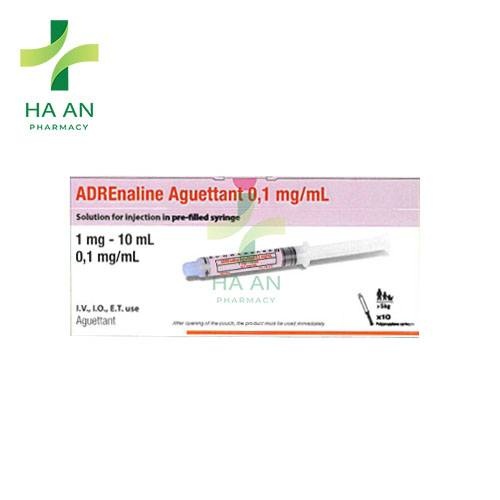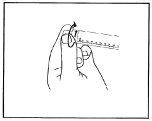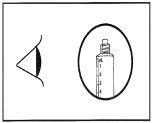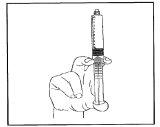

ADRENALINA AGUETTANT 0,1 mg/mL SOLUÇÃO INJETÁVEL EM SERINGA PREENCHIDA

Pergunte a um médico sobre a prescrição de ADRENALINA AGUETTANT 0,1 mg/mL SOLUÇÃO INJETÁVEL EM SERINGA PREENCHIDA

Como usar ADRENALINA AGUETTANT 0,1 mg/mL SOLUÇÃO INJETÁVEL EM SERINGA PREENCHIDA
Introdução
Prospecto: informação para o paciente
Adrenalina Aguettant 0,1 mg/ml, solução injetável em seringa precarregada
(Doravante “Adrenalina injetável”)
Epinefrina
Leia todo o prospecto atentamente antes de começar a usar este medicamento, porque contém informações importantes para si.
- Conserva este prospecto, porque pode ter que voltar a lê-lo.
- Se tiver alguma dúvida, consulte o seu médico, farmacêutico ou enfermeiro.
- Este medicamento foi prescrito apenas para si, e não deve dá-lo a outras pessoas, mesmo que tenham os mesmos sintomas que si, porque pode prejudicá-las.
- Se experimentar efeitos adversos, consulte o seu médico, farmacêutico ou enfermeiro, mesmo que se trate de efeitos adversos que não aparecem neste prospecto. Ver seção 4.
Conteúdo do prospecto
- O que é Adrenalina injetável e para que se utiliza
- O que precisa saber antes de começar a usar Adrenalina injetável
- Como usar Adrenalina injetável
- Possíveis efeitos adversos
- Conservação de Adrenalina injetável
- Conteúdo do envase e informação adicional
1. O que é Adrenalina injetável e para que se utiliza
Adrenalina injetável pertence a um grupo de medicamentos denominados agentes adrenérgicos e dopaminérgicos.
Este medicamento é utilizado para:
- Tratamento do paro cardíaco (perda inesperada da função cardíaca, da respiração e do conhecimento).
- Tratamento de anafilaxia aguda em adultos (choque ou colapso graves produzidos por uma reação alérgica grave).
2. O que precisa saber antes de que lhe administrem Adrenalina injetável
Não lhe devem administrar Adrenalina injetável
- se é alérgico (hipersensível) a algum dos componentes deste medicamento (incluídos na seção 6), quando se disponha de uma apresentação alternativa de adrenalina ou um vasopressor alternativo.
Advertências e precauções
Adrenalina injetável está indicada para o tratamento de urgência. É necessária supervisão médica contínua após a administração.
Precauções de uso
O risco de efeitos adversos aumenta se si:
- apresenta antecedentes médicos de hipertireoidismo (doença da glândula tireoideana);
- apresenta insuficiência renal grave;
- sofre de hipercalcemia (aumento da concentração de cálcio no sangue);
- sofre de hipopotasemia (diminuição da concentração de potássio no sangue);
- apresenta diabetes mellitus;
- apresenta uma cardiopatia ou hipertensão arterial;
- apresenta dano cerebral ou endurecimento das artérias do cérebro;
- apresenta glaucoma (aumento da pressão no olho);
- apresenta distúrbios da próstata;
- é um paciente de idade avançada;
- está grávida.
Uso em desportistas
Informa-se os desportistas que este medicamento contém adrenalina, que pode produzir um resultado positivo nas provas de controlo de dopagem
Uso de Adrenalina injetável com outros medicamentos
Informa o seu médico se está a tomar, tomou recentemente ou possa ter que tomar qualquer outro medicamento.
Os medicamentos que podem interagir com Adrenalina injetável incluem:
- anestésicos halogenados volátiles (gás utilizado durante a anestesia);
- certos antidepressivos;
- fármacos para tratar a hipertensão arterial, as afecções do coração;
- fármacos para tratar a diabetes.
Gravidez e amamentação
Se está grávida ou em período de amamentação, acredita que possa estar grávida ou tem intenção de engravidar, consulte o seu médico ou farmacêutico antes de que lhe administrem este medicamento.
Condução e uso de máquinas
Receber Adrenalina injetável não afeta a sua capacidade para conduzir ou usar máquinas.
Adrenalina injetável contém sódio
Este medicamento contém 35,4 mg de sódio (componente principal do sal de mesa/para cozinhar) em cada seringa. Isto equivale a 1,77% da ingestão diária máxima de sódio recomendada para um adulto.
3. Como se administra Adrenalina injetável
Adrenalina injetável será administrada pelo seu médico, enfermeiro ou auxiliar de saúde. Eles terão que decidir a quantidade correta para si, assim como quando e como deve ser administrada.
Em caso de reações alérgicas potencialmente mortais (anafilaxia aguda):
Aos adultosserá administrada uma dose de 0,05 mg (0,5 ml da solução 1:10.000 de adrenalina) tantas vezes quantas forem necessárias até obter a resposta desejada.
Em caso de paro cardíaco:
Adultos:administra-se 1 mg (10 ml da solução 1:10.000 de adrenalina) em uma veia ou no osso cada 3-5 minutos até que o coração comece a funcionar.
Crianças com mais de 5 kg:administram-se 10 microgramas/kg (0,1 ml/kg da solução 1:10.000 de adrenalina) em uma veia ou no osso cada 3-5 minutos até que o coração comece a funcionar.
Este medicamento não é adequado para administrar uma dose menor de 0,5 ml e, portanto, não deve ser usado em recém-nascidos ou crianças com um peso corporal menor de 5 kg.
4. Possíveis efeitos adversos
Como todos os medicamentos, este medicamento pode produzir efeitos adversos, embora nem todas as pessoas os sofram.
Foram notificados os seguintes efeitos adversos:
- ansiedade;
- dispnéia (dificuldade para respirar);
- nervosismo;
- medo;
- sudorese;
- palpitações (batimento cardíaco irregular ou acelerado);
- taquicardia (frequência cardíaca aumentada);
- palidez;
- trejeiros;
- fraqueza;
- tonturas;
- dor de cabeça;
- náuseas;
- vómitos;
- frio nas extremidades;
- alucinações;
- síncope;
- hiperglicemia (níveis altos de açúcar no sangue);
- hipopotasemia (níveis baixos de potássio no sangue);
- acidose metabólica (aumento da acidez no sangue);
- midríase (dilatação da pupila).
A doses elevadas ou em pacientes sensíveis à adrenalina, os efeitos adversos são:
- arritmia cardíaca (batimentos cardíacos irregulares/paro cardíaco);
- hipertensão arterial (com risco de hemorragia cerebral);
- vasoconstrição (estreitamento dos vasos sanguíneos, por exemplo, cutâneos, nas extremidades ou nos rins);
- angina de peito aguda;
- risco de infarto agudo de miocárdio.
As injeções locais repetidas podem produzir necrose (dano tissular) nos locais de injeção, como resultado da constricção vascular (constricção dos vasos sanguíneos).
Em todos os casos, é necessária a supervisão médica após a administração de Adrenalina injetável.
Comunicação de efeitos adversos
Se experimentar qualquer tipo de efeito adverso, consulte o seu médico, farmacêutico ou enfermeiro, mesmo que se trate de possíveis efeitos adversos que não aparecem neste prospecto. Também pode comunicá-los diretamente através do Sistema Espanhol de Farmacovigilância de Medicamentos de Uso Humano: www.notificaram.es. Mediante a comunicação de efeitos adversos, você pode contribuir para fornecer mais informações sobre a segurança deste medicamento
5. Conservação de Adrenalina injetável
Mantenha este medicamento fora da vista e do alcance das crianças.
Não deve receber este medicamento após a data de validade que aparece na etiqueta. A data de validade é o último dia do mês que se indica. O seu médico ou enfermeiro verificarão isso.
Conservar na bolsa de alumínio para protegê-la da luz e do oxigénio.
Não conservar a temperatura superior a 25°C.
Não abra a bolsa de alumínio até que vá usá-la.
Depois de abrir a bolsa, o produto deve ser usado imediatamente.
Não congele.
Não utilize objetos afiados para abrir a bolsa.
Não deve receber Adrenalina injetável se foi parcialmente utilizada ou mostra indícios visíveis de deterioração.
Os medicamentos não devem ser jogados nos esgotos nem na lixeira. Deposite os envases e os medicamentos que não precisa no Ponto SIGRE da farmácia. Em caso de dúvida, pergunte ao seu farmacêutico como se livrar dos envases e dos medicamentos que já não precisa. Dessa forma, ajudará a proteger o meio ambiente.
6. Conteúdo do envase e informação adicional
Composição de Adrenalina injetável
O princípio ativo é epinefrina (adrenalina):
Cada ml de solução injetável contém 0,1 mg de epinefrina (adrenalina), em forma de tartrato de adrenalina.
Cada seringa precarregada de 10 ml contém 1 mg de epinefrina (adrenalina), em forma de tartrato de adrenalina.
Os demais componentes são cloreto de sódio, ácido clorídrico, hidróxido sódico, água para preparações injetáveis.
Aspecto do produto e conteúdo do envase
Adrenalina injetável é uma solução incolor transparente em uma seringa precarregada de polipropileno de 10 ml, envasada individualmente em um blister transparente e envolvida em uma bolsa de alumínio.
As seringas precarregadas estão disponíveis em caixas de 1 e 10 seringas.
Pode ser que apenas alguns tamanhos de envases estejam comercializados.
Titular da autorização de comercialização:
Laboratoire Aguettant
1, rue Alexander Fleming
69007 LYON
FRANÇA
Responsável pela fabricação:
Laboratoire Aguettant
1, rue Alexander Fleming
69007 LYON
FRANÇA
Laboratoire Aguettant
Lieu Dit Chantecaille
07340 Champagne
FRANÇA
Representante Local:
AGUETTANT IBÉRICA
C/ Baldini Reixac, 4-8, Torre I, 4º08028, Barcelona-Espanha
Data da última revisão deste prospecto: Julho 2024
A informação detalhada e atualizada deste medicamento está disponível na página web da Agência Espanhola de Medicamentos e Produtos Sanitários (AEMPS) http://www.aemps.gob.es/.
Esta informação está destinada apenas a profissionais do setor sanitário:
A adrenalina intravenosa apenas deve ser administrada por aquelas pessoas que tenham experiência no uso e ajuste da dose de vasopressores na sua prática clínica habitual.
Ressuscitação cardiopulmonar:
10 ml de solução 1:10.000 (1 mg), por via intravenosa ou intraóssea, repetida cada 3-5 minutos até que volte a circulação espontânea.
O uso endotraqueal deve ser usado apenas como último recurso se nenhuma outra via de administração for acessível, a uma dose de 20 a 25 ml de solução 1:10.000 (2 a 2,5 mg).
Em paro cardíaco após uma intervenção cirúrgica cardíaca, a adrenalina deve ser administrada por via intravenosa em doses de 0,5 ml ou 1 ml de solução 1:10.000 (50 ou 100 microgramas) com muita precaução e ajustando a dose até obter o efeito.
Anafilaxia aguda:
Ajustar a dose usando bolos intravenosos de 0,5 ml de solução 1:10.000 (0,05 mg) segundo a resposta.
Adrenalina 0,1 mg/ml (1:10.000) solução injetável em seringa precarregada não é recomendada para uso intramuscular em casos de anafilaxia aguda. Para a administração intramuscular, deve ser utilizada uma solução de 1 mg/ml (1:1000).
População pediátrica:
Este medicamento não é adequado para administrar uma dose menor de 0,5 ml e, portanto, não deve ser usado por via intravenosa ou intraóssea em recém-nascidos e crianças com um peso corporal menor de 5 kg.
Paro cardíaco em crianças:
Via intravenosa ou intraóssea (apenas para crianças com mais de 5 kg): 0,1 ml/kg de solução 1:10.000 (10 microgramas/kg) até uma dose única máxima de 10 ml de solução 1:10.000 (1 mg), repetida cada 3-5 minutos até que volte a circulação espontânea.
O uso endotraqueal (em qualquer faixa de peso) deve ser usado apenas como último recurso se nenhuma outra via de administração for acessível, a uma dose de 1 ml/kg de solução 1:10.000 (100 microgramas/kg) até uma dose única máxima de 25 ml de solução 1:10.000 (2,5 mg).
Siga estritamente o seguinte protocolo:
A seringa precarregada está destinada a um único paciente. Descarte a seringa após o seu uso. Não reutilize.
O produto deve ser inspecionado visualmente para detectar partículas e mudanças de cor antes da sua administração. Apenas deve ser usada a solução transparente, incolor e sem partículas ou precipitados.
O produto não deve ser usado se a bolsa ou o blister foram abertos ou se o selo de segurança da seringa (camada de plástico na base do capuchão da ponta) está quebrado.
- Abra a bolsa de alumínio com a mão usando apenas a(s) fenda(s).
Não utilize objetos afiados para abrir a bolsa.
- Retire a seringa precarregada do blister estéril.
- Empurre o êmbolo para liberar o tampão. O processo de esterilização pode ter feito com que o tampão se adira ao corpo da seringa.

- Desrosqueie o capuchão da ponta para quebrar o selo.Não toque na conexão de Luer exposta para evitar a contaminação.

- Verifique se o selo da seringa foi removido por completo. Caso contrário, recoloque o capuchão e gire-o novamente.
 Retire o ar empurrando o êmbolo com suavidade.
Retire o ar empurrando o êmbolo com suavidade.
- Conecte a seringa ao dispositivo de acesso vascular ou à agulha.
Empurre o êmbolo para injetar o volume necessário.
A eliminação do medicamento não utilizado e de todos os materiais que tenham estado em contato com ele será realizada de acordo com a normativa local.
- País de registo
- Substância ativa
- Requer receita médicaSim
- Fabricante
- Esta informação é apenas para referência e não constitui aconselhamento médico. Consulte sempre um médico antes de tomar qualquer medicamento. A Oladoctor não se responsabiliza por decisões médicas baseadas neste conteúdo.
- Alternativas a ADRENALINA AGUETTANT 0,1 mg/mL SOLUÇÃO INJETÁVEL EM SERINGA PREENCHIDAForma farmacêutica: INJETÁVEL, Adrenalina base 1 mg/mlSubstância ativa: epinephrineFabricante: B Braun Medical S.A.Requer receita médicaForma farmacêutica: INJETÁVEL, 1 mg/mlSubstância ativa: epinephrineFabricante: Laboratorios Basi Industria Farmaceutica S.A.Requer receita médicaForma farmacêutica: INJETÁVEL, 1 mg/mlSubstância ativa: epinephrineFabricante: Bradex S.A.Requer receita médica
Alternativas a ADRENALINA AGUETTANT 0,1 mg/mL SOLUÇÃO INJETÁVEL EM SERINGA PREENCHIDA noutros países
As melhores alternativas com o mesmo princípio ativo e efeito terapêutico.
Alternativa a ADRENALINA AGUETTANT 0,1 mg/mL SOLUÇÃO INJETÁVEL EM SERINGA PREENCHIDA em Polónia
Alternativa a ADRENALINA AGUETTANT 0,1 mg/mL SOLUÇÃO INJETÁVEL EM SERINGA PREENCHIDA em Ukraine
Médicos online para ADRENALINA AGUETTANT 0,1 mg/mL SOLUÇÃO INJETÁVEL EM SERINGA PREENCHIDA
Avaliação de posologia, efeitos secundários, interações, contraindicações e renovação da receita de ADRENALINA AGUETTANT 0,1 mg/mL SOLUÇÃO INJETÁVEL EM SERINGA PREENCHIDA – sujeita a avaliação médica e regras locais.










